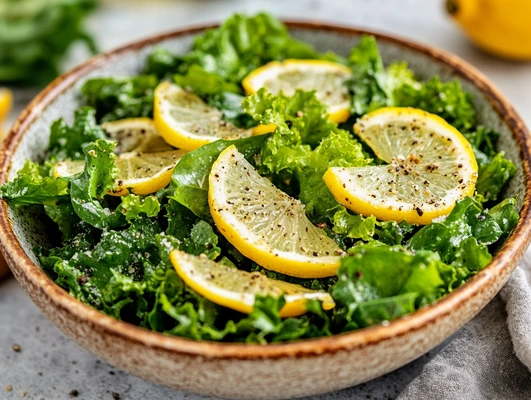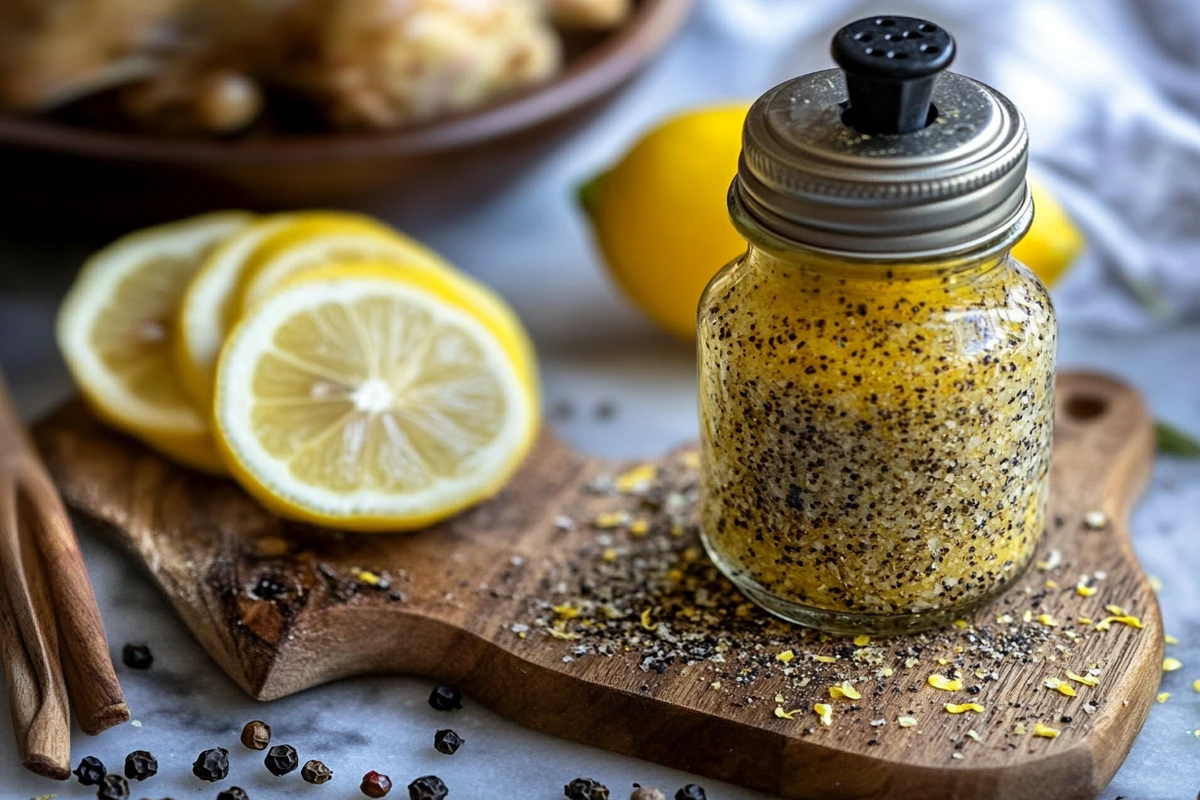When it comes to enhancing your dishes with a burst of citrus and spice, the choice of lemon pepper vs. lemon and pepper can make all the difference. These seasonings may sound similar, but their unique flavors and uses can take your cooking to the next level.
1: Introduction
When cooking with citrus and spice, have you ever paused to wonder whether lemon pepper seasoning and lemon and pepper seasoning are the same? Though they sound similar, these two seasonings have distinct characteristics that set them apart, influencing their taste, ingredients, and usage. Whether you’re a home cook, a professional chef, or simply curious about spicing up your dishes, understanding their differences can help elevate your culinary creations.
In this article, we’ll dive into the nuances of lemon pepper seasoning vs. lemon and pepper seasoning, explore their unique flavors, compare their applications, and offer tips to choose the right option for your next recipe.
2: What is Lemon Pepper Seasoning?
What is Lemon Pepper Seasoning?
Lemon pepper seasoning is a versatile spice blend made from a mix of dried lemon zest, black pepper, and often additional ingredients like salt, garlic powder, or onion powder. It’s celebrated for its bold and tangy flavor profile, which combines the zesty brightness of lemon with the robust spice of black pepper. This seasoning is a staple in many kitchens because it enhances the natural flavors of various dishes without overpowering them.
The preparation of lemon pepper seasoning involves drying lemon zest and blending it with freshly cracked black pepper. Additional flavor-enhancing ingredients are sometimes included to create a more balanced and layered seasoning mix. Its tangy, peppery, and slightly savory taste makes it ideal for a range of recipes, from grilled meats to roasted vegetables.
Ingredients of Lemon Pepper Seasoning
Lemon pepper seasoning typically contains:
- Dried Lemon Zest: The key ingredient that provides the citrusy punch.
- Black Pepper: Freshly cracked peppercorns add depth and a touch of heat.
- Salt: Used to enhance the overall flavor profile.
- Optional Ingredients: Some blends include garlic powder, onion powder, or sugar for additional flavor dimensions.
This mix results in a seasoning that’s as versatile as it is flavorful, allowing cooks to elevate their dishes effortlessly.
Common Uses for Lemon Pepper Seasoning
Lemon pepper seasoning shines in recipes where you want bold citrus flavors balanced with spice. Some popular uses include:
- Grilled Meats: Perfect for chicken, beef, or seafood dishes like salmon or shrimp.
- Vegetables: Adds zest to roasted or sautéed vegetables.
- Pasta and Rice: Enhances the flavor of creamy pasta sauces and rice pilaf.
- Snacks: Sprinkle over popcorn or roasted nuts for a tangy twist.
Image Suggestion: A close-up of a bowl of lemon pepper seasoning with its vibrant yellow and black specks.
3: What is Lemon and Pepper Seasoning?
What is Lemon and Pepper Seasoning?
Lemon and pepper seasoning is a straightforward combination of two fresh ingredients: lemon and black pepper. Unlike the more complex, pre-mixed lemon pepper seasoning, this blend is often made fresh and has a light, zesty, and aromatic flavor profile. It’s a great option when you want to highlight the natural freshness of citrus paired with the subtle heat of pepper.
Ingredients of Lemon and Pepper Seasoning
- Lemon: Typically used as fresh juice or zest, it delivers a vibrant, tangy citrus flavor.
- Black Pepper: Freshly ground black pepper adds an aromatic and slightly spicy kick, balancing the tartness of the lemon.
Common Uses for Lemon and Pepper Seasoning
This seasoning is particularly versatile in dishes where freshness is key. Popular uses include:
- Salads: A great way to brighten up green salads or fruit salads.
- Dressings: Perfect for making vinaigrettes or marinades with a citrus-forward flavor.
- Seafood: Enhances the delicate, natural flavors of fish and shellfish.
- Desserts: Occasionally used as a garnish for lemon-based desserts to add a hint of spice.

4: Key Differences Between Lemon Pepper Seasoning and Lemon and Pepper Seasoning
Lemon pepper seasoning and lemon and pepper seasoning may sound similar, but their characteristics and applications are distinct. Here’s how they differ across several key aspects:
1. Flavor Profile
- Lemon Pepper Seasoning: Bold and tangy, with the zesty punch of dried lemon zest complemented by the sharpness of black pepper. Optional additions like garlic or onion powder enhance its savory notes.
- Lemon and Pepper Seasoning: Fresh and light, combining the natural tartness of fresh lemon with the subtle heat of freshly ground black pepper. It emphasizes freshness and simplicity.
2. Ingredients
- Lemon Pepper Seasoning: Dried lemon zest, black pepper, and salt are the base, with optional ingredients like garlic powder or sugar for depth.
- Lemon and Pepper Seasoning: Only two ingredients—fresh lemon juice or zest and freshly cracked black pepper—highlight the natural flavors.
3. Shelf Life
- Lemon Pepper Seasoning: Thanks to its dried components, it has a long shelf life and can be stored for months in an airtight container.
- Lemon and Pepper Seasoning: Since it’s made with fresh ingredients, it should be used immediately or stored for a short time to maintain quality.
4. Best Uses
- Lemon Pepper Seasoning: Ideal for grilling and roasting meats, seasoning vegetables, and adding bold flavors to snacks like popcorn.
- Lemon and Pepper Seasoning: Best suited for salads, seafood, dressings, and dishes that call for a bright, fresh finish.
5. Preparation
- Lemon Pepper Seasoning: Ready to use right out of the jar, making it a convenient choice for quick recipes.
- Lemon and Pepper Seasoning: Requires preparation each time, using fresh lemon zest or juice combined with ground pepper. This extra effort delivers a unique freshness.
This comparison illustrates that while both seasonings feature lemon and pepper, their preparation, flavor profiles, and ideal applications are suited to different culinary needs. Choose based on the flavor intensity and freshness required for your dish.
5: How to Use Lemon Pepper Seasoning and Lemon and Pepper Seasoning
| Use Case | Lemon Pepper Seasoning | Lemon and Pepper Seasoning | Image Suggestion |
|---|---|---|---|
| Grilled Meats | Enhances the flavor of grilled chicken, steak, or fish with its bold, tangy taste. | Perfect for a light and fresh touch on grilled seafood or poultry. | Grilled chicken seasoned with lemon pepper vs. grilled fish with fresh lemon and pepper. |
| Vegetables | Roasted or sautéed vegetables gain a savory, zesty flavor boost. | Best for steamed or fresh vegetables needing a bright and fresh citrusy garnish. | Roasted broccoli with lemon pepper vs. steamed asparagus with lemon and pepper. |
| Salads and Dressings | Adds a punch of zest to creamy salad dressings or potato salads. | Ideal for vinaigrettes and fresh greens for a bright, refreshing taste. | A bowl of salad with a creamy dressing vs. a vinaigrette drizzled on leafy greens. |
| Seafood | Works well for baking or broiling salmon, shrimp, or cod for a bold, zesty flavor. | Brings out the delicate flavors of fresh fish and shellfish with subtle citrus. | Lemon pepper salmon vs. a shrimp dish with fresh lemon and cracked pepper. |
| Snacks | Great for sprinkling over popcorn, chips, or roasted nuts for extra flavor. | Rarely used for snacks, but can garnish a citrus-forward snack. | A bowl of popcorn with lemon pepper seasoning. |
| Pasta and Rice Dishes | Adds depth to creamy pasta sauces or seasoned rice dishes. | Provides a light, refreshing note for lemon-based pasta dishes or pilaf. | Creamy pasta with lemon pepper seasoning vs. a lemon-zest pasta with fresh pepper. |
6: Can Lemon and Pepper Be Substituted for Lemon Pepper Seasoning?
Understanding the Substitution
Lemon and pepper can be substituted for lemon pepper seasoning in some cases, but the results may vary depending on the dish. Lemon pepper seasoning is a pre-mixed blend with a bold, tangy, and savory profile, while lemon and pepper seasoning provides a fresher and more subtle flavor. Knowing when and how to substitute is essential for achieving the desired taste.
When Substitution Works
- Fresh Dishes: Lemon and pepper is a great substitute in fresh, uncooked recipes like salads or dressings, where its lighter flavor complements the dish.
- Quick Fixes: If you’re out of lemon pepper seasoning, combining fresh lemon juice or zest with black pepper can work in a pinch, especially for marinades or steamed vegetables.
When Substitution Doesn’t Work
- Bold Flavors Needed: For recipes requiring intense citrusy and savory flavors, such as grilled meats or roasted dishes, lemon pepper seasoning is irreplaceable due to its depth and complexity.
- Texture: Lemon pepper seasoning often includes salt and other spices that contribute to the texture and overall balance of the dish. Using fresh lemon and pepper may lack these layers.
How to Substitute
If substituting, use 1 teaspoon of fresh lemon juice or zest and 1/2 teaspoon of black pepper to replace 1 teaspoon of lemon pepper seasoning. Add a pinch of salt to mimic the seasoning’s flavor balance.
Final Tip
While substitution is possible, for the best results, use the seasoning intended for the recipe. Each has unique qualities that bring out the best in different dishes.
7: FAQs: Your Questions Answered
1. Can I use lemon juice and black pepper instead of lemon pepper seasoning?
Yes, you can! Combine fresh lemon juice or zest with black pepper and a pinch of salt to approximate the flavor. However, the result will be fresher and less intense compared to the bold taste of lemon pepper seasoning.
2. Which seasoning is better for grilled chicken?
Lemon pepper seasoning is the better choice for grilled chicken due to its bold, tangy, and savory profile. Lemon and pepper seasoning works best for lighter, more citrus-forward recipes.
3. Is lemon and pepper seasoning the healthier option?
Both are great options for enhancing flavors without added fats. However, lemon and pepper seasoning is naturally low in sodium since it doesn’t typically include salt, unlike some lemon pepper seasoning blends.
4. Can lemon pepper seasoning be used in desserts?
It’s uncommon, but you can use a pinch of lemon pepper seasoning in desserts like lemon-flavored cookies for a unique sweet and savory twist. However, lemon and pepper seasoning is better suited for such applications due to its freshness.
5. How do I store lemon pepper seasoning?
Store lemon pepper seasoning in an airtight container in a cool, dry place to maintain its flavor and freshness for months.
6. Can I make my own lemon pepper seasoning at home?
Absolutely! Dry lemon zest, mix it with freshly ground black pepper and salt, and store it in a container. You can also add garlic or onion powder for extra depth.
8: Conclusion: Choosing the Right Option
Deciding between lemon pepper seasoning and lemon and pepper seasoning depends on the type of dish and the flavor intensity you prefer. Lemon pepper seasoning, with its bold and tangy profile, is perfect for recipes requiring robust flavors, such as grilled meats, roasted vegetables, and hearty snacks. Its convenience and long shelf life make it a staple in many kitchens.
On the other hand, lemon and pepper seasoning is best for fresh and light dishes where the natural zest of lemon and the subtle spice of freshly cracked black pepper can shine. It’s an excellent choice for salads, seafood, and citrus-forward recipes that benefit from a clean, vibrant finish. The freshness of its ingredients brings a unique character to any dish.
Both seasonings have their strengths and can transform your cooking in distinct ways. By understanding their unique qualities, you can choose the one that best suits your needs. For a delicious recipe featuring lemon pepper seasoning, explore Grilled Lemon Pepper Chicken. It’s a flavorful way to make the most of this versatile blend!

